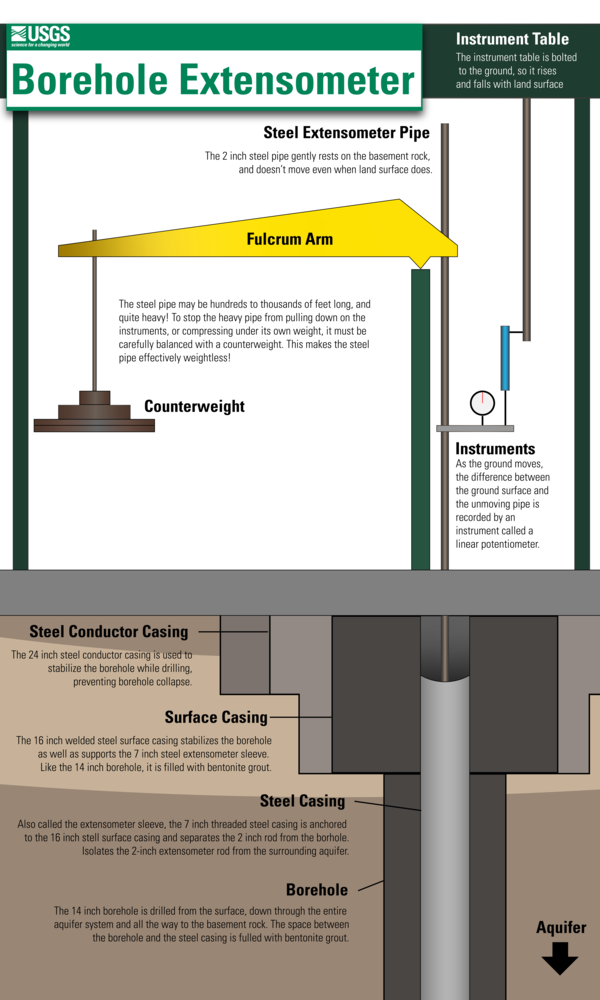A borehole extensometer is an instrument that measures vertical land motion caused by changes in aquifer thickness. A borehole is drilled through the entirety of an aquifer system and the steel pipe is anchored at the base to the basement rock.
Extensometer - Glacial Isostatic Adjustment
Detailed Description
A borehole extensometer is an instrument that measures vertical land motion caused by changes in aquifer thickness. A borehole is drilled through the entirety of an aquifer system and the steel pipe is anchored at the base to the basement rock. Aquifer compaction is measured by the change in the length of the extensometer pipe which protrudes above the ground surface.
Extensometers do not measure vertical land motion that is caused by deep-earth processes such as glacial isostatic adjustment, because the source of the land motion is below the point where the extensometer pipe is anchored.
Based on the USGS extensometer at Nansemond, Virginia (USGS 365337076251606 59D 39).
Sources/Usage
Public Domain.
Related
The Virginia Extensometer Network
A borehole extensometer is an instrument that measures vertical land motion caused by changes in aquifer thickness. A borehole is drilled through the entirety of an aquifer system and the steel pipe is anchored at the base to the basement rock.
A borehole extensometer is an instrument that measures vertical land motion caused by changes in aquifer thickness. A borehole is drilled through the entirety of an aquifer system and the steel pipe is anchored at the base to the basement rock.
A borehole extensometer is an instrument that measures vertical land motion caused by changes in aquifer thickness. A borehole is drilled through the entirety of an aquifer system and the steel pipe is anchored at the base to the basement rock.
Borehole Extensometer
Borehole extensometers are highly sensitive instruments which measure aquifer compaction. This infographic explains the various parts of a borehole extensometer, and is modeled after the USGS extensometer at Nansemond, Virginia.
Borehole Extensometer
Borehole extensometers are highly sensitive instruments which measure aquifer compaction. This infographic explains the various parts of a borehole extensometer, and is modeled after the USGS extensometer at Nansemond, Virginia.
Related
The Virginia Extensometer Network
A borehole extensometer is an instrument that measures vertical land motion caused by changes in aquifer thickness. A borehole is drilled through the entirety of an aquifer system and the steel pipe is anchored at the base to the basement rock.
A borehole extensometer is an instrument that measures vertical land motion caused by changes in aquifer thickness. A borehole is drilled through the entirety of an aquifer system and the steel pipe is anchored at the base to the basement rock.
A borehole extensometer is an instrument that measures vertical land motion caused by changes in aquifer thickness. A borehole is drilled through the entirety of an aquifer system and the steel pipe is anchored at the base to the basement rock.
A borehole extensometer is an instrument that measures vertical land motion caused by changes in aquifer thickness. A borehole is drilled through the entirety of an aquifer system and the steel pipe is anchored at the base to the basement rock.
Borehole Extensometer
Borehole extensometers are highly sensitive instruments which measure aquifer compaction. This infographic explains the various parts of a borehole extensometer, and is modeled after the USGS extensometer at Nansemond, Virginia.
Borehole Extensometer
Borehole extensometers are highly sensitive instruments which measure aquifer compaction. This infographic explains the various parts of a borehole extensometer, and is modeled after the USGS extensometer at Nansemond, Virginia.






